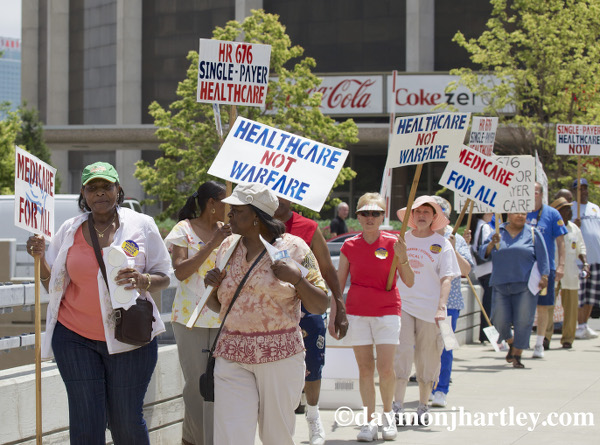
PHOTO/DAYMONJHARTLEY.COM
ATLANTA—A lot of people are tangled up defending the indefensible mess of the Affordable Care Act and its rollout also known as the ACA or ‘Obamacare.’
Behind the frustrations of technical problems that inevitably come with enshrining the commodification of healthcare lies a deep-seated hope for real access to quality, comprehensive and compassionate healthcare.
It is that vision of what is now possible, free universal comprehensive healthcare for all regardless of documentation status that needs articulation. History is the great teacher for the responsibilities of the present.
The summer of 2013 marked the 50th anniversary of the Mississippi Freedom Summer. Throughout the South, numerous Peoples Movement Assemblies, gatherings, marches and rallies brought forward that history to help shape the future.
In 1963, the southern Medical Committee for Human Rights (MCHR) was forged out of the bloody struggle against Jim Crow and for liberation. African American physicians in Mississippi that supported the struggle lost segregated hospital privileges, had their student loans recalled and were generally forced to leave the State in order to practice medicine.
Dr. Robert Smith didn’t leave. He came together with others and formed southern MCHR. They began to document the brutalities unleashed on civil rights workers, treat injuries and initiate free clinics.
Very quickly the social movement for equality and the burning need for equal access to quality healthcare merged and remained so until the neoliberal onslaught of the 1970’s.
One of the most telling points of that history was the 1968 political platform of the independent Mississippi Freedom Democratic Party. Two points of that program bear witness to the unfinished matter of healthcare today:
1. “Place the present Medicaid problem on a national basis with national standards, like Medicare, instead of having it optional for the states.” And, 2. “Every person shall receive free and complete medical care from the day he is born until the day he dies.” 1968, Mississippi Freedom Democratic Party (MFDP).
What was true then is truer now and more necessary and possible today.
Every southern state has declined to expand a public Medicaid program, leaving nearly five million excluded from a region that has proportionally the most uninsured, who are eligible for Medicaid expansion.
The application of electronics to medical care and the explosion of scientific and medical knowledge sets the basis for the distribution of healthcare based on need, not money. In the 1960’s healthcare was only mid-way in its transformation from cottage to the corporate entity it is today. Revolutionary momentum in the 1960’s was tied to struggles for national liberation, but were ‘capped’ short of a class struggle for power. The heart of the MFDP platform of 1968 was its independent political position. Neither the southern states democratic parties then nor the national Democratic Party now can hold a program for a publically run and accountable national health system. The veterans of the fight for equality did not compromise their dreams then, why should our class settle for less now?
